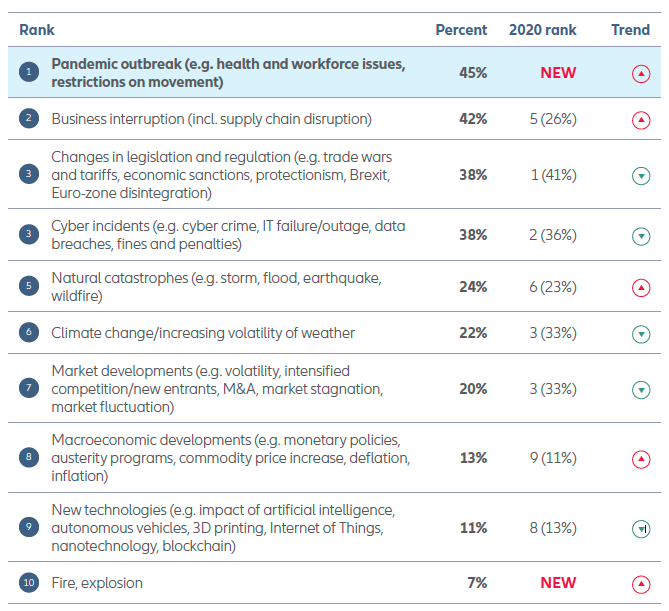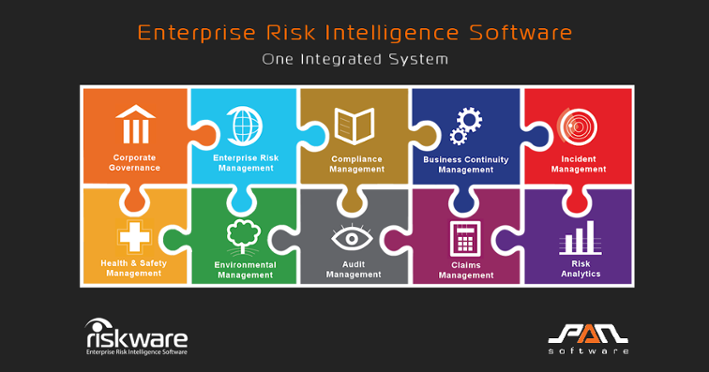After the challenges of 2020 and the continuing impact of the global pandemic, risk awareness and prevention has taken on a whole new level of significance for businesses everywhere.
As we move forward into another year of uncertainty, the Alliance Global Risk Barometer 2021 provides some valuable insights into the most important business risks that should be front of mind. This annual report is based on the responses of more than 2700 risk management leaders from 92 countries and territories around the world who are surveyed for their insights on the biggest business risks corporations face in the 12 months ahead (and beyond).
Unsurprisingly, pandemic outbreak has leapt into the number two position globally (up from #17 last year), and number one in Australia (where it is new to the list). Business interruption and cyber incidents also feature prominently, and all three of these concerns are something that organisations, large and small, must be prepared for as we move forward into another unprecedented year of uncertainty.
While it’s impossible to know what lies ahead this year, the Global Risk Barometer provides an opportunity for us to prepare ourselves for those risks that are likely to cause the most peril. So, let’s take a closer look at the top 5 biggest risks facing Australian businesses in 2021.
 Source: Allianz Global Corporate & Specialty.
Source: Allianz Global Corporate & Specialty.
#1: Pandemic outbreak
While previously individual organisations and even industries have experienced major disruptions, the pandemic has caused chaos on a scale that most of us have never before seen – and in response, pandemic outbreak jumped straight to the top of the Australian business risk list in 2021.
Businesses have endured forced closures due to local lockdowns and restrictions, as well as major supply chain interruptions, which appears to be a real vulnerability of a global economy in the face of extreme events. Even those businesses with an existing continuity plan in place are unlikely to have anticipated everything the pandemic has thrown our way. The ability to bounce back strongly from a crisis, to pivot and adapt in an unpredictable and volatile environment, and to have a strong and resilient business continuity plan in place is now more essential than ever.
#2: Business interruption
As we touched on above, the disruption to business as a result of the pandemic outbreak has been unprecedented, and this led to business interruption jumping to #2 from #5 in 2020. Many organisations who were forced to shut down have needed to think out of the box to find new ways of trading that align with continually changing restrictions on trade and movement.
Supply chains have experienced significant delays, and this has been another challenge to overcome, as has switching to work from home arrangements due to limitations to on site numbers. Again, the businesses who had a continuity plan in place were often able to pivot to a new way of working rapidly and seamlessly, especially those supported by business continuity software.
#3: Changes in legislation
It topped the list in last year’s report, and changes in legislation again rated highly, coming in at equal third. Although the pandemic has well and truly taken centre stage, there remains some important potential legislation changes to respond to in the coming year.
Those forecast to impact business include sustainability measures in response to a transition to a low carbon or net zero carbon economy and data management and digital security. It’s vital that all organisations are not only staying ahead of the curve when it comes to these changes, they must also be able to manage them to be sure they are complying. With the ever-changing landscape many businesses rely on compliance management software and support to keep them organised and up to date.
#3: Cyber incidents
Our ever-growing reliance on technology in business has only intensified over the past year, with the transition to remote working, a massive jump in online sales and an increase in the transfer of sensitive digital files. Add to this the always evolving sophistication of cyber threats, and it’s little wonder that the risk of cyber incidents ranked highly again, this year coming in at equal third.
Fortunately, there are many ways to protect your business from cyber threats, including security software, backups, encryption and continual training of staff. There is a need to be proactive and vigilant here as the cyber landscape can rapidly change. An integrated risk management software system is a good way to identify potential threats before they cause trouble.
#5: Natural catastrophe
After the devasting bushfires of 2020, it’s not hard to see why natural catastrophe has moved up one place to round out the top 5. A natural catastrophe can not only cause significant losses on the ground, it can also result in businesses being unable to resume operations and service customers for some time.
Although impossible to predict, you can minimise the impact of natural catastrophes by preparing and maintaining a solid business continuity plan, which outlines how you would manage and respond if your business was impacted by a storm, flood, cyclone or wildfire.
Understand the risks and be prepared
With much uncertainty lingering in the air around what 2021 and beyond will bring, the need for adequate risk management for business has never been greater.
In a world where COVID-19 exists and continues to impact how we live and work, being prepared for how the pandemic affects our business and the possibility of continuing or renewed business interruptions is a must. On top of this the ongoing need to stay informed and compliant with new legislations, protect your business from the ongoing threat of cyber incidents and being prepared if a natural catastrophe does strike, should be high on the priority list of every business owner to ensure you survive the tough times and continue to thrive.
Wondering if our risk management software can help reduce the risk in your business? Find out about our integrated system here, and contact our team for expert advice.






